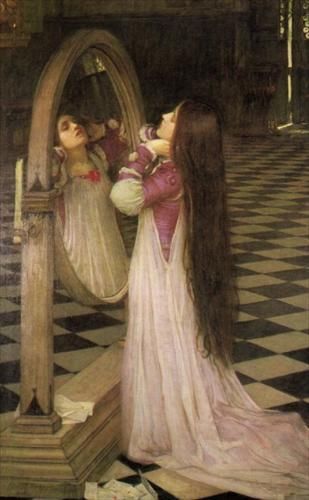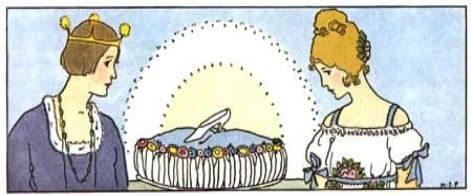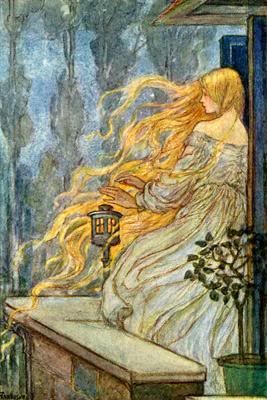Snow, Blood, Silver
by Sara Cleto

The window frame gleamed silver in the wintery light, not black as ebony at all. But the snow beyond it shone white: pristine, unmarked, expectant. When the Queen pricked her finger on a needle and a drop of blood fell to sparkle wetly on the sill, the momentum of the story overtook her.
A child, with skin as white as snow, lips as red as blood, hair as silver as a coin, a storm—The ancestral mirror-on-the-wall glimmered, drawing her eye, the clouded surface parting like waves. In the glass, the Queen’s hair glowed like starlight, and for a moment, the room flooded with silver.
Nine months passed, and there was a child. She was snowy and crimson and black as the pupil of a cat’s eye. The Queen remembered the silver of the windowpane, the mirror, the light, but then the story did say black, and besides, the Princess was perfect. Silver fled from her mind even as it tumbled past her shoulders to brush the baby’s face with starlight.
Mirror, Mirror, on the Wall,
Make her fairest of them all.
The Queen clothed the Princess in velvets and lace and denim and plaid, and the child ruined them all. She romped through the trees and dirt and rain, her snow and blood and ebony glowing irrepressibly through her tattered gowns.
The Queen sighed and resigned herself to more laundry.
The Princess was precocious, and in due time, she went away to school. The letters she sent home burst with half-formed musings, roses dreaming themselves into bloom. The Queen gazed in the mirror, saw her child waver in the glass like a fish darting through water.
Mirror, Mirror, on the Wall
Make her fairest of them all.
One blindingly bright summer day, the Queen heard a light, unmistakable footstep on the stair.
She ran to meet the Princess, but it wasn’t quite her. Her skin was too white, her cheeks hectic red to match her lips. And her hair, her beautiful ebony hair, was thin and bare on her head.
The Queen put the Princess to bed, brought her infusions with ginger and sunflowers and honey. The Princess sipped reluctantly and retreated under the quilt that the Queen had sewn.
At dawn, the bed was empty but for three drops of blood.
And so the Queen cast off her velvets and lace and dressed herself in leather and denim, winding a length of plaid around her forehead to keep the silver from her face. She dragged on her heaviest boots and pair of hunting gloves, and she stole into the forest.
The forest opens itself to no one, not even Queens. The roots tangle, the branches rip. The mist curls and chokes, and the animals howl for blood. The Queen pulled a hunting knife from her belt and her mirror from her pocket.
Mirror, Mirror, Off-The-Wall
Where is my fairest one of all?
The mirror flashed, revealing a coffin made of glass and, beneath it, the Princess’s dead face. The Queen cursed, threw the glass against a tree, and it shattered into pieces. For a moment, the forest filled with silver light, and the Queen dove through it like a star falling from the sky.
She found the Princess in a cave whose darkness was as black as the ebony that should have been her windowpane. The king of the wolves crouched over her. His fangs gleamed like falling snow.
The Queen lifted her knife, but she knew the wolf would not bleed for her.
Mirror, Mirror, shattered glass
Make my Princess a bad ass.
She placed the knife in her daughter’s hand, closed her own fingers around her fist, and in the darkness, silver gleamed in the Princess’s eyes.
The wolf king’s death was redder than blood.
The Queen wrapped the Princess’s bald head in velvet and lace and put her to bed. When the Princess came down to the breakfast table in the morning, a thick mane of pure silver—like a coin, a storm, a victory—poured down her back like liquid metal.
Sara Cleto received her B.A. in English Literature from the University of Pennsylvania and her MA in Folklore and Literature at George Mason University. She is currently pursuing her PhD in English at the Ohio State University. She grew up in Atlanta, Georgia but has lived in England, Ireland, and Peru in addition to many locations in the US.
Where do you get the ideas for your stories?
I’m particularly inspired by fairy tales and folklore, the stories that you hear over and over and sometimes take for granted. I love taking those familiar shapes and warping them to create something unexpected and empowering. I wonder about the silence or marginalized characters in the stories, what they might like to say or do, and that’s when a new story creeps up on me.






